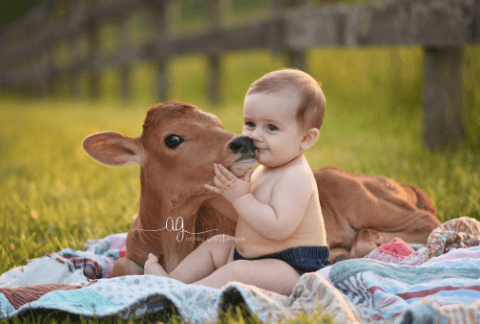Baby:Tug3anmwsk0= Cows

The early life of calves is a critical period that establishes the foundation for their health and productivity. With a gestation period of approximately nine months, the significance of maternal care and proper nutrition cannot be overstated. The relationship between a mother cow and her calf not only affects physical development but also plays a pivotal role in shaping emotional resilience. Understanding these dynamics raises important questions about best practices in calf management and welfare that can lead to improved outcomes for the entire herd. What strategies can be employed to enhance this vital bond?
Life Cycle of Baby Cows
The life cycle of baby cows, or calves, begins with gestation, which typically lasts around nine months.
This is followed by crucial early development stages that significantly impact their health and growth.
During these growth stages, calves reach important health milestones, including proper weight gain and immune system development.
Understanding these phases is essential for ensuring their well-being and future productivity in a humane, freedom-oriented environment.
See also: Baby:Tug3anmwsk0= Cow
Care and Nutrition Requirements
Ensuring optimal care and nutrition during the early stages of a calf’s life is vital for promoting healthy growth and long-term productivity.
Implementing effective feeding strategies tailored to individual needs supports proper development.
Additionally, regular health monitoring is essential to identify potential issues early, allowing for timely interventions.
Together, these practices foster strong, resilient calves, contributing to the overall well-being of the herd.
The Mother-Calf Bond
Fostering a strong mother-calf bond is integral to the emotional and physical development of the calf, influencing its behavior, health, and overall growth trajectory.
Maternal instincts drive bonding behaviors, such as grooming and vocalizations, which establish trust and security.
This connection not only enhances the calf’s well-being but also fosters independence, enabling it to thrive in a natural environment while seeking freedom.
Conclusion
In conclusion, the early development of calves is a delicate interplay between nurturing care and the inherent instinct for independence.
While adequate nutrition and environmental conditions are paramount for robust growth, the emotional connection between mother and calf serves as a cornerstone for overall well-being.
This juxtaposition of physical sustenance and emotional security underscores the importance of humane practices in livestock management, ultimately fostering healthy individuals that contribute positively to the herd dynamics.




